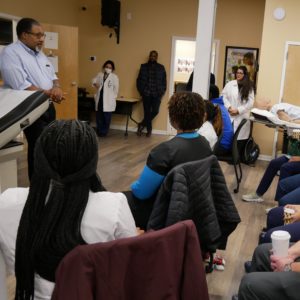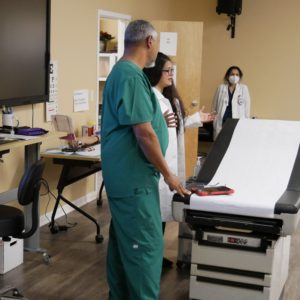Death and the Medical Student
by Michael Bailey
One story that should be on the required reading list of every medical student is Godfather Death by the Brother’s Grimm. For those of you on a study break the link below and five minutes is all you need to agree with me at the conclusion of this article.
http://www.pitt.edu/~dash/grimm044.html
If you trust this humble narrator’s spoiler free interpretation of the tale please read on.
Written in 1857 Godfather Death was included in a collection of fairytales read by parents to children huddled in their beds at night to lull them to sleep. Given that life was pretty harsh, wolves still roamed the countryside, and the average age of death was in the mid-thirties, there probably wasn’t much that scared little children then.
A man chooses Death to be the Godfather of his thirteenth son due to Death’s unbiased methodology in selecting those to take the eternal dirt nap. The boy grows up to be a world famous physician capable of diagnosing people at only a glance, and curing them, if they could be cured, with a special herb. Death’s only instruction to his godson was that when he (Death) was at their feet they were not be cured.
I won’t spoil the story for those who haven’t read it, but given that this is from the authors who brought us Hansel and Gretel and tons of other stories where children get eaten it can’t end well. From this story however; comes a fundamental truth all medical students should consider when their hearts and hands are reaching out to a patient.
You simply cannot cheat death.
When it’s their time, when it’s your time, it is simply time. Every physician you will encounter during your clerkships, and residency will tell you a story about a man who walked away from a car crash at a dynamite factory without a scratch, and also about woman who died from a splinter, or some equivalent.
Many of you come to the field with the intent of helping your fellow humans, but not everyone can be cured. A great deal of what you do, no matter how futile it seems when staring in the face of something like cancer, may simply be to provide the needed comfort and dignity that results from good medical care.
Admissions essays from medical students everywhere are full of personal accounts where future doctors were forever changed by the suffering of a friend or loved one, and called to the profession to help those in need. Psychologically we cope with, and are driven by these losses to transform ourselves from someone who once watched helplessly, into someone who can snatch these people from the jaws of death and suffering. You will be this savior, but not always.
In the 1993 comedy Groundhog Day weatherman Phil Connors, played brilliantly by Bill Murray, is given the ability to relive the same day over and over again. He stumbles upon a sick old man who dies after Phil brings him to a hospital. With the power to relive the day Phil meets the old man at an earlier time and does everything he can to avoid his death to no avail.
“Sometimes people just die,” the nurse wisely states. Here is the two minute scene from the film.
https://www.youtube.com/watch?v=6mKpGmdmvtk
To the scientists; senescence is inevitable.
To the truly wise; “to everything there is a season.”
People will die and be born all in the same building. Never let the sadness of one rob you of the joy of another. Never let the joy of one make you forget the passing of another. Most importantly, never let the loss of one discourage you from saving and helping the next.



